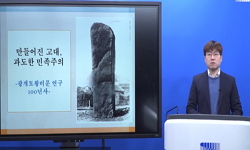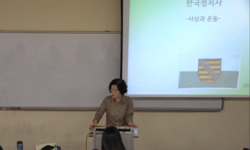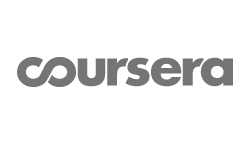Examined in this article is the “Korean history (and history textbooks) controversy,” which has been going on fiercely since the mid-2000s. People tend to view differently the experiences of the Korean people being colonized, nationalism that t...
http://chineseinput.net/에서 pinyin(병음)방식으로 중국어를 변환할 수 있습니다.
변환된 중국어를 복사하여 사용하시면 됩니다.
- 中文 을 입력하시려면 zhongwen을 입력하시고 space를누르시면됩니다.
- 北京 을 입력하시려면 beijing을 입력하시고 space를 누르시면 됩니다.
https://www.riss.kr/link?id=A101928073
- 저자
- 발행기관
- 학술지명
- 권호사항
-
발행연도
2016
-
작성언어
Korean
- 주제어
-
KDC
900
-
등재정보
KCI등재
-
자료형태
학술저널
- 발행기관 URL
-
수록면
129-169(41쪽)
- 제공처
- 소장기관
-
0
상세조회 -
0
다운로드
부가정보
다국어 초록 (Multilingual Abstract)
Examined in this article is the “Korean history (and history textbooks) controversy,” which has been going on fiercely since the mid-2000s.
People tend to view differently the experiences of the Korean people being colonized, nationalism that they held onto to escape from such ruling, and the subsequent democratization process as well as anti-Communist attitudes that prevailed. It was such a dynamic period, so academic approaches to define the era had already been in place in the early 2000s, but discussions have thus been distorted, manipulated and oppressed, by power-hungry politicians and other individuals. The government’s nationalization of Korean history textbooks in 2015 placed history under politics, and pushed back the entire discussion to a condition that existed before the past two decades.
In this article, in order to properly analyze the issue, the controversy itself is comprehensively examined. As a result of such examination, it becomes clear that in order to reestablish academic approaches to sensitive historical experiences, institutional devices to prevent the government and politicians’ intervention in history education are more than necessary, and need to be established soon. It is also evident that, as the collisions have been triggered by the clash of certain macroscopic viewpoints (under the labels of progressive and conservative) trying to reinterpret 100 years that was the Korean modernity, it is imperative (for the revival of healthy discussions) that discussions should return to the original goal, which was meant to establish an understanding of the century based upon forward thinking attitude.
Only after a social consensus -over the relationship between historical education and politics- is established, and a new perspective to view one hundred years of Korean modernity is properly put in place, questions like where the state should stand in historical education, what should be the ultimate goal of Korean history education in the 21st century, and what kind of institutions should be developed in order to ensure that, could be answered appropriately.
목차 (Table of Contents)
- 머리말
- 1. 역사(교육)의 정치도구화와 균열
- 2. 학술적 논의로의 전환과 민족주의 비판
- 3. 역사(교육)의 재정치도구화와 식민주의 공방
- 맺음말 : ‘위기’ 극복을 위한 방향 모색
- 머리말
- 1. 역사(교육)의 정치도구화와 균열
- 2. 학술적 논의로의 전환과 민족주의 비판
- 3. 역사(교육)의 재정치도구화와 식민주의 공방
- 맺음말 : ‘위기’ 극복을 위한 방향 모색
- 참고문헌
- 〈Abstract〉
동일학술지(권/호) 다른 논문
-
- 한국역사연구회
- 박현순(서평자)
- 2016
- KCI등재
-
- 한국역사연구회
- 이동원(서평자)
- 2016
- KCI등재
-
- 한국역사연구회
- 송호정(Song, Ho-jung)
- 2016
- KCI등재
-
- 한국역사연구회
- 최종석(Choi, Jong-suk)
- 2016
- KCI등재






 KCI
KCI DBpia
DBpia







